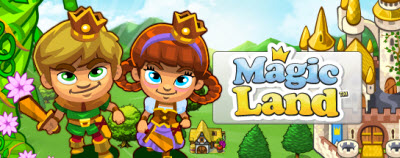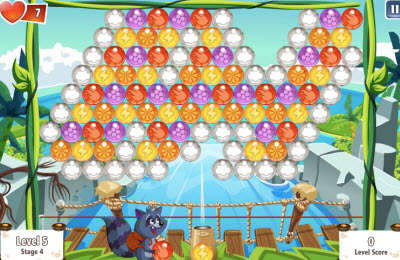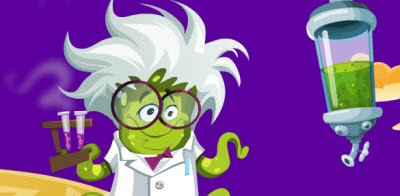GamesBeat: You tried out Google+. Are you going to stay with it?
Begemann: We tried Google+. We’re really keen to see how it develops, but also this morning Google announced Play. They seem to be focused on that.
 GamesBeat: In one GDC session, they talked about one Google. They’re going to have games across Chrome, Android, and Google+. It’s going to be one unified platform by next year.
GamesBeat: In one GDC session, they talked about one Google. They’re going to have games across Chrome, Android, and Google+. It’s going to be one unified platform by next year.
Begemann: I think for us, it’s good to be part of that and to see how it develops. It’s obviously still early. Everybody knows that Google+ doesn’t have the scale of Facebook, but it’s interesting to observe how that will work out.
GamesBeat: And on Facebook’s continuous improvement, what do you see now that is helping you, and what do you want to still see happen in the future?
Begemann: Overall, we’re really happy with the development of Facebook. We look at our monthly active users, and we look at 2011 overall. We’ve grown 185 percent, almost threefold. We are really, really happy with what we see there.
Overall, Facebook I think is doing a good job. Obviously there are always ways to improve, but I think Facebook is doing the right things. Also with their increased focus on mobile. We’re using Facebook Connect in Diamond Dash on the iPhone, and we’re really happy with how they’ve simplified the process of using an iPhone app to connect with Facebook. This process has really, over the last few months, become much smoother. They now have virality on mobile. They’re taking the right steps in the right direction. It will take some time to really be perfect, but our belief is that social mobile — mobile games that are not just single-player but that are really social, where you play with your friends — will play an important role in 2012.
GamesBeat: Does third-party publishing on Zynga.com attract you at all?
Begemann: Zynga has just announced it, and we will observe how Zynga.com develops. I think Zynga now launches with their own games. It seems to be a couple of smaller developers that are launching on Zynga.com, and we will observe how that develops. But overall, really, if I look at what we do, our focus is really…we create games for everyone, right? We don’t create games for gamers. It’s different from Kabam and others. We create games for everyone.
What Zynga does there is, they really improve the experience as a gamer destination. You have your gamer friends there, you have a separate site if you’re a gamer, and so on. We’re really addressing the group where the grandmother plays with her grandson, or where colleagues play with each other. It’s really people who usually don’t play games. We want to bring our games there where they are, and that’s today on Facebook. These people are not necessarily keen to go to a separate gamer destination. But we’ll see how it will develop over time.
 GamesBeat: Might Wooga.com might be an option down the road? [laughs]
GamesBeat: Might Wooga.com might be an option down the road? [laughs]
Begemann: Maybe, but, short-term, as I said, we’re really focused on Facebook and iOS at the moment. There are many reasons why we developed for iOS instead of Android at first.
GamesBeat: King.com sort of came out of nowhere as well, and it’s interesting that the competition seems to be game-by-game on Facebook. It’s very fluid competition, where people rise and fall. It changes a lot.
Begemann: Obviously I’ve known King.com for many years. In the U.S. they’re not well-known, but [they are] in Europe, with their own site and their skill-based games. Many of them have been around a long time. They’re very successful with Bubble Witch Saga.
It’s true that there’s lots of development on Facebook as far as ups and downs. We try to stay away from this short-term focus. We try to focus on very long-term, sustainable growth. For example, if you look at where our traffic is coming from, only five percent of our new users come from advertising. About 40 percent come from virality and 55 percent from cross-linking between our different games. We do not rely on advertising and do not rely on really driving traffic in short bursts.
Instead, we have very constant improvement every week, making the game a little bit bigger and better every week, trying to get sustainable growth. If you look at our four biggest games — Diamond Dash, Bubble Island, Monster World, and Magic Land — they all have between 4.5 and 18 million monthly active users. All of those had their all-time high last week. So for us really, it’s not this typical game product life cycle. Games are a service these days, and if you treat them as a service and you constantly improve them and have sustainable growth, you can really achieve that. They can have very long lifetimes.
Maybe our philosophy’s a little bit different from some other companies.
GamesBeat: Are you experiencing that FarmVille phenomenon, too, where the monetization also gets better?
Begemann: We don’t reveal details, but yes, we also see monetization improvements. For some games, these improvements may come because the overall audience goes down, and the people who are most committed to the game stay. Therefore, revenue per user increases. For us, I think it’s more about applying this constant improvement that we apply to something like engagement.
We also apply this constant improvement to things like monetization. In Monster World for example, we’ve revealed those numbers. Monster World is a game that I think is a little bit underestimated by many out there. In terms of daily active users, it’s a top 15 Facebook game. It launched April 2010 and is now almost two years old. One year after launch we introduced this new resource called WooGoo. It’s concentrated rainbow slime.
In this fantasy world, it’s the rainbow you see, concentrated. You can generate it during the game, but you can also buy it. That alone has improved Monster World monetization by 50 percent. It’s now a third of all revenue. Basically, what you do is you introduce completely new gameplay elements, and you keep users really sticky over long periods of time.
 GamesBeat: How many games are you shooting to get out this year?
GamesBeat: How many games are you shooting to get out this year?
Begemann: Um…more than we had in the previous year?
But overall, we do very, very few. We’re live now for two and a half years, and we’ve only launched six games. Four of them, we still actively have teams on and actively improve. All of those four hit their all-time high last week. So we don’t do a lot of games; we only do something like two or three per year on Facebook. And we now have as many people working on mobile as we have on Facebook.
This here…have you seen this T-shirt [editor’s note: pictured at top]? This is how we see ourselves. What we try to do, making our games…
GamesBeat: “Love plus brains…”?
Begemann: Yes. What we basically say is, there is this traditional approach to games, which is, you just follow your heart. You just follow your instincts. And then there’s sometimes this very new approach that is often criticized, of only following the numbers and doing nothing else. What we try to do is combine our hearts and our brains to get those [games] out.
GamesBeat: Have you been hit by any of the copycats out there?
Begemann: There was Diamond Dash on the Android Market, yeah. The same name even. Exactly the same name, exactly the same game.
GamesBeat: Did you get them to take it down quickly, or is it still up there?
Begemann: It was quite recent. As of two days ago it was still there, but we’re in contact with Google. And if you search for Diamond Dash in the iTunes App Store, you see games that have extremely similar gameplay. They’re called different names, but they used “Diamond Dash” as a keyword.
So imitation is the biggest form of flattery. We are really happy about that. No, really, I am. That, I think, shows that we are very slowly becoming a little bit relevant?
![]() GamesBeat 2012 is VentureBeat’s fourth annual conference on disruption in the video game market. This year we’re calling on speakers from the hottest mobile, social, PC, and console companies to debate new ways to stay on pace with changing consumer tastes and platforms. Join 500+ execs, investors, analysts, entrepreneurs, and press as we explore the gaming industry’s latest trends and newest monetization opportunities. The event takes place July 10-11 in San Francisco, and you can get your early-bird tickets here.
GamesBeat 2012 is VentureBeat’s fourth annual conference on disruption in the video game market. This year we’re calling on speakers from the hottest mobile, social, PC, and console companies to debate new ways to stay on pace with changing consumer tastes and platforms. Join 500+ execs, investors, analysts, entrepreneurs, and press as we explore the gaming industry’s latest trends and newest monetization opportunities. The event takes place July 10-11 in San Francisco, and you can get your early-bird tickets here.
VentureBeat's mission is to be a digital town square for technical decision-makers to gain knowledge about transformative enterprise technology and transact. Learn More
